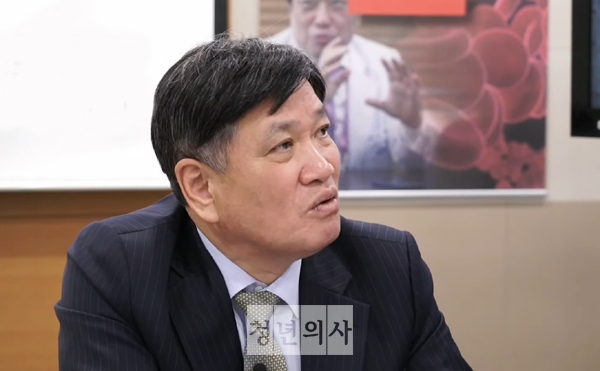The new coronavirus has infected more than 2.5 million people around the world, and health experts warn that the northern globe might suffer a second wave of the outbreaks in the upcoming winter.
Although Korea’s daily new cases came down at around 10 in recent days, the medical community is calling for a reorganization of the nation’s healthcare system to brace for a resurge of Covid-19 cases. The new system should not only enhance responses to infectious diseases but provide a safe environment for patients with other diseases, experts said.
Jeong Young-ho, the new president of the Korea Small & Medium Hospital Association and president of Hallym Hospital, said the nation needs to revise the medical system to fight a long-term battle against Covid-19, at a YouTube show “Corona Fighters Live” Tuesday by K-Healthlog, a channel operated by The Korean Doctors’ Weekly.

“Tertiary hospitals, including the five largest ones, should focus more on critically ill patients. That way will be more efficient for the entire healthcare system. For Covid-19 isolation and patient care, small and medium-sized hospitals should play a bigger role,” Jeong said.
The government should provide a system so that hospitals can operate facilities and equipment to handle outbreaks of infectious diseases, he said.
Hospital operators often say they feel like they are “playing a Russian roulette” when treating Covid-19 suspected patients, Jeong pointed out. “When an urgent patient comes, the hospital has no choice but to care for the patient even if the patient shows Covid-19 symptoms. So, the hospital treats the patient first and waits for the test results,” he said.
To make ends meet, most medium and small hospitals should receive patients to fill more than 90 percent of the hospital beds, Jeong noted. However, to deal with an infectious disease, they will be forced to run only 75-80 percent of the hospital beds soon, he said.
“Hospitals need negative pressure intensive care units so that Covid-19 patients and general patients do not have overlapping movements,” he said.
Jeong urged the government to invest in small and midsize hospitals so that they can shift the operating system from a normal one to an emergency one in case of an infectious disease outbreak.
To do so, the government should prepare a new reimbursement policy to support hospitals’ separate patient care centers to handle a large-scale outbreak, Jeong stressed. “We need a new normal reimbursement in the new normal era. The reimbursement should particularly focus on the service for severe patients,” he said.
Lee Wang-jun, chairman of the Myongji Hospital, who also heads the working group of the Korean Hospital Association's new coronavirus emergency response headquarters, said hospitals should build a dual system where care for infectious diseases and non-infectious diseases is available simultaneously.
“For this system to work, we need additional workforce and facilities. The government should prepare reimbursement to support this,” he said.
He went on to say that establishing an infectious disease-specialized hospital alone cannot solve all the problems. “Such a hospital could buffer some initial shocks, but it cannot solve everything. All the hospital system should go dual for infectious and non-infectious diseases,” Lee said.

